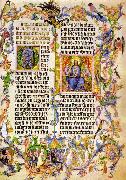Wholesale Oil Painting No Minimum |
|||||||||||
|
|
|||||||||||

|
|||||||||||
|
|
|
||||||||
|
|
||||||||
First Folio of the Golden Bull of Charles IV
First Folio of the Golden Bull of Charles IV Painting ID:: 65248 |
1400 Vellum, 42 x 29,5 cm ?sterreichische Nationalbibliothek, Vienna In 1400 Wenceslas, King of Bohemia and Emperor of the Holy Roman Empire, had a copy made of the Golden Bull - a version of the Empire's constitution - first issued in 1356. The copy is richly decorated and displays a number of the emblems of Wenceslas himself. We do not know what part political considerations played in the commission, nor how great a part was played by his enthusiasm for beautiful books. At all events, in the same year Wenceslas was deprived by the electors from his rank as emperor. The volume is among the few that survived from his magnificent library. The text arranged in two columns is encircled by stylized acanthus leaves and scrolls. The light colours of the fleshy leaves appear like tongues of flames in the space they have created for themselves. A variety of tiny figures and animals painted from a close observation of nature, or derived from fairytales, are to be seen among the serpentine vines: birds, monkeys, a bear, a dog, a crouching monk, a "savage" in animals' skins who is holding a heraldic shield, girls dressed in light and loose garments, etc. In their shapes and colours these figures resemble the foliate ornaments, curving along with the vines. Indeed, the maidens' draperies are tied at the waist, and look like vines. On the other hand, the blue acanthus leaves in the round field in the bottom right turn into spilt water, where the tub has been turned upside down. Below the entangled foliate ornaments the motifs are compressed around a three-dimensional letter W, in which the monarch himself is depicted. The humorous detail with the bathing-women, a nearly nude female figure and towels tied into knots are, on the one hand, symbols of the Luxembourg dynasty and, on the other, of eroticism, referring to the love of the King and Queen, inspired by the plays of chivalric poetry. But, in addition to this, a romantic and Utopian desire for general physical and spiritual cleansing is also expressed in these representations (motifs of bathing) as well as for a return to the primordial state of mankind (the savage). The text of the Golden Bull begins with a prayer to the Creator, which is illustrated by the Maiestas Domini on the right-side column. The figures of the Lord and two praying angels appear in a three-dimensional frame which seems to lift their figures from the sphere of the world of nature; nevertheless it does not break the homogeneity of the folio, because it gives the impression of being stretched between two green stems of the foliate decoration, while new shoots spring from its corners. Artist: UNKNOWN MASTER, Bohemian , First Folio of the Golden Bull of Charles IV , 1351-1400 , Bohemian , graphics , historical 1400 Vellum, 42 x 29,5 cm ?sterreichische Nationalbibliothek, Vienna In 1400 Wenceslas, King of Bohemia and Emperor of the Holy Roman Empire, had a copy made of the Golden Bull - a version of the Empire's constitution - first issued in 1356. The copy is richly decorated and displays a number of the emblems of Wenceslas himself. We do not know what part political considerations played in the commission, nor how great a part was played by his enthusiasm for beautiful books. At all events, in the same year Wenceslas was deprived by the electors from his rank as emperor. The volume is among the few that survived from his magnificent library. The text arranged in two columns is encircled by stylized acanthus leaves and scrolls. The light colours of the fleshy leaves appear like tongues of flames in the space they have created for themselves. A variety of tiny figures and animals painted from a close observation of nature, or derived from fairytales, are to be seen among the serpentine vines: birds, monkeys, a bear, a dog, a crouching monk, a "savage" in animals' skins who is holding a heraldic shield, girls dressed in light and loose garments, etc. In their shapes and colours these figures resemble the foliate ornaments, curving along with the vines. Indeed, the maidens' draperies are tied at the waist, and look like vines. On the other hand, the blue acanthus leaves in the round field in the bottom right turn into spilt water, where the tub has been turned upside down. Below the entangled foliate ornaments the motifs are compressed around a three-dimensional letter W, in which the monarch himself is depicted. The humorous detail with the bathing-women, a nearly nude female figure and towels tied into knots are, on the one hand, symbols of the Luxembourg dynasty and, on the other, of eroticism, referring to the love of the King and Queen, inspired by the plays of chivalric poetry. But, in addition to this, a romantic and Utopian desire for general physical and spiritual cleansing is also expressed in these representations (motifs of bathing) as well as for a return to the primordial state of mankind (the savage). The text of the Golden Bull begins with a prayer to the Creator, which is illustrated by the Maiestas Domini on the right-side column. The figures of the Lord and two praying angels appear in a three-dimensional frame which seems to lift their figures from the sphere of the world of nature; nevertheless it does not break the homogeneity of the folio, because it gives the impression of being stretched between two green stems of the foliate decoration, while new shoots spring from its corners. Artist: UNKNOWN MASTER, Bohemian , First Folio of the Golden Bull of Charles IV , 1351-1400 , Bohemian , graphics , historical |
|||||||
|
CONTACT US |

